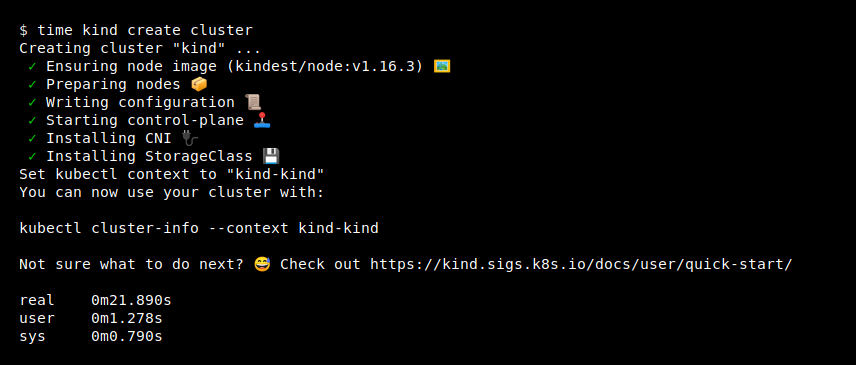
kind is a tool for running local Kubernetes clusters using Docker container “nodes”.
kind was primarily designed for testing Kubernetes itself, but may be used for local development or CI.
If you have go 1.17+ and docker, podman or nerdctl installed go install sigs.k8s.io/kind@v0.31.0 && kind create cluster is all you need!

kind consists of:
- Go packages implementing cluster creation, image build, etc.
- A command line interface (
kind) built on these packages. - Docker image(s) written to run systemd, Kubernetes, etc.
kubetestintegration also built on these packages (WIP)
kind bootstraps each “node” with kubeadm. For more details see the design documentation.
NOTE: kind is still a work in progress, see the 1.0 roadmap.
Installation and usage 🔗︎
For more detailed instructions see the user guide.
You can install kind with go install sigs.k8s.io/kind@v0.31.0 (for go 1.17+). This will put kind in
$(go env GOPATH)/bin. You may need to add that directory to your $PATH as
shown here if you encounter the error
kind: command not found after installation.
To use kind, you will also need to install docker.
Once you have docker running you can create a cluster with:
|
To delete your cluster use:
|
To create a cluster from Kubernetes source:
- ensure that Kubernetes is cloned in
$(go env GOPATH)/src/k8s.io/kubernetes - build a node image and create a cluster with
|
Multi-node clusters and other advanced features may be configured with a config
file, for more usage see the user guide or run kind [command] --help
Community 🔗︎
Please reach out for bugs, feature requests, and other issues!
The maintainers of this project are reachable via:
- Kubernetes Slack in the #kind channel
- filing an issue against this repo
- The Kubernetes SIG-Testing Mailing List
Current maintainers are @aojea and @BenTheElder – feel free to reach out directly if you have any questions!
Pull Requests are very welcome!
If you’re planning a new feature, please file an issue to discuss first.
Check the issue tracker for help wanted issues if you’re unsure where to
start, or feel free to reach out to discuss. 🙂
See also: our own contributor guide and the Kubernetes community page.
Why kind? 🔗︎
- kind supports multi-node (including HA) clusters
- kind supports building Kubernetes release builds from source
- support for make / bash or docker, in addition to pre-published builds
- kind supports Linux, macOS and Windows
- kind is a CNCF certified conformant Kubernetes installer
Code of conduct 🔗︎
Participation in the Kubernetes community is governed by the Kubernetes Code of Conduct.

